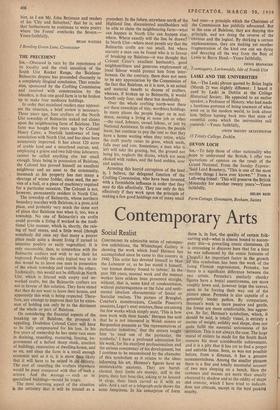THE PRECEDENT
Sta,—,Obscured in turn by the remoteness of its locality and the rival sensation of the South Uist Rocket Range, the Balelone- Balmartin dispute has proceeded discreetly to a completely illogical conclusion. That conclu- sion, sponsored by the Crofting Commission and received with consternation by the islanders, is that one good farm is to be broken up to make four mediocre holdings.
In order that mainland readers may appreci- ate the situation, a brief review is necessary. Three years ago, four crofters of the North Uist township of Balmartin staked out claims upon the neighbouring farm of Balelone. This farm was bought five years ago by Colonel Henry Cator, a Norfolk landowner of long association with North Uist, and has since been extensively improved. It has about 120 acres of arable land and a moorland outrun, and, employing a grieve and two full-time labourers, cannot be called anything else but small enough. Since being in possession of Balelone, the Colonel has proved himself an excellent neighbour and an asset to the community, inasmuch as his property has met many a shortage of winter fodder, clean seed, the ser- vice of a bull, or a piece of machinery required for a particular occasion. The Colonel is not, however, permanently resident in North Uist.
The township of Balmartin, whose northern boundary marches with Balelone, is a poor, arid place, and probably very much the• Same sort of place that Balelone was when it, too, was a township. No one of Balmartin's six crofts could provide a living if worked in the tradi- tional Uist manner, which is, shortly, the rais- ing of beef stores•, and a little wool (though somebody did once say that many a poorer place made quite a decent living if turned to intensive poultry or early vegetables). It is only reasonable, then, to sympathise with the Balmartin crofters and wish to see their lot improved. Possibly the only logical way to do this would be to leave one man in possession of the whole township and resettle the others. Technically, this would not be difficult in North Uist, which is littered with empty and un- worked crofts, but the Balmartin crofters are not in favour of this solution. They have stated that they do not want to leave their homes, and apparently this wish is being respected. There- fore, any attempt to improve their lot by exten- sion of holding can only be to the detriment of the whole or part of Balelone.
On considering the financial aspects of the breaking up of Balelone, the prospect is appalling. Doubtless Colonel Cator will have to be fully compensated for his loss. In his five years of ownership he has spent vast sums in draining, reseeding, manuring, fencing, im- provement of a hefted sheep stock, erection of buildings, renovation of dwelling-house, and so on, and since the farm is a small enough economic unit as it is, it is more than likely that it will have to be seized in itti entirety. The cost of resettling the crofters elsewhere would be puny compared with that of such a seizure. And the wastage — such as in specialised buildings—would be tragic. The most alarming aspect of the situation is the certainty that it will be treated as a
precedent. In the future, anywhere north of the Highland line, discontented smallholders will be able to claim the neighbouring farm—what can happen in North Uist can happen else- where. Where exactly will the line be drawn? In North Uist—where most people say that the Balmartin crofts are too small, but where scarcely a man can be found who is in favour of breaking up Balelone—it was thought that Colonel Cator's excellent husbandry, good neighbourliness and generous employment of local labour would protect him from inter- ference. On the contrary, there does not seem to be any appreciation by the Commission of the fact that Balelone, as it is now, is an actual and material benefit to dozens of crofters, whereas, if broken up to Balmartin, it would benefit only four, and these but doubtfully.
Over the whole crofting north-west there are these townships of tiny, worthless holdings. In many places the people linger on in resi- dence, earning a living at some job or other —the road, lobsters, casual labour, or just by National Assistance. In other places, the people leave, but continue to pay the rent so that they have a home waiting when they retire, while the croft yearly raises its grass, which seeds, falls over and rots. Sometimes, a man who is left will take the grazing, but, the ground not being his, neglects the drains, which are soon choked with rushes, and the land sodden, sour and useless.
Arresting this horrid corruption of the land is, I believe, the delegated function of the Crofting Commission, who have been invested with a formidable influence in order that they may do this effectively. They can only do this effectively if they work upon the principle of making a few good holdings out of many small bad ones—a principle which the Chairman of the Commission has publicly advocated. But in the case of Balelone, they are denying this principle, and are doing the reverse of the obvious and the logical. By shirking a certain unpleasantness, they are making yet another fragmentation of the kind one can see dying and decaying all the way from the Butt of Lewis to Barra Head.—Yours faithfully,
DENIS BRANAGAN
Trumisgarry, Lochmoddy, Isle of North Uist LASKI AND THE UNIVERSITIES


































 Previous page
Previous page